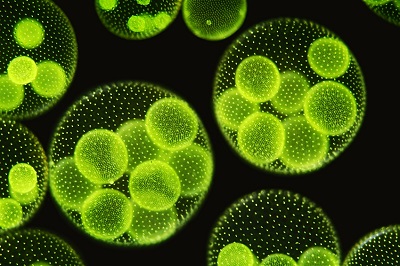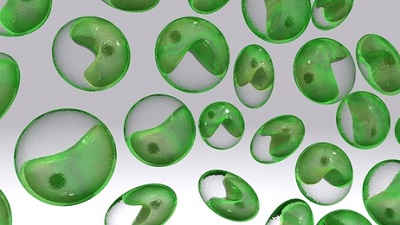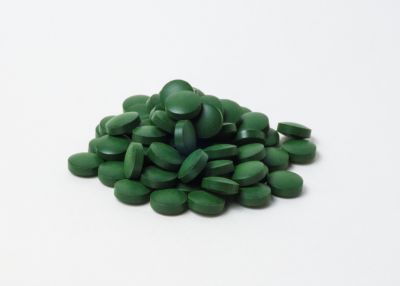
Allma® chlorella titrated in vitamin B12
Vitality, Wellness, Cognitive Health and Immune System
Allma® Chlorella is a natural "superfood" 100% of Portuguese origin, very interesting and high-quality nutritional profile.
Composed 100% of the microalgae Chlorella vulgaris (Chlorella), it is an important source of vitamin B12, chlorophyll and lutein.
Chlorella is gluten-free and is distributed by Elementa in France and the Benelux:
- titrated in B12: ideal for a vegan target
- or in "smooth" or "white" form: light green and white respectively, their tastes and odours are more neutral, they are particularly suitable for beverages, and adapt to all types of formulations.
1. What is Chlorella?
Chlorella vulgaris, like all members of the genus Chlorella, is a unicellular (microscopic) eukaryotic green alga.
Chlorella vulgaris is a photoautotroph: it can use light as an energy source and CO2 as a carbon source to synthesise its own food.
The sun supplies the energy needed for photosynthesis. Chlorophyll, a green pigment found in virtually all photosynthetic organisms, captures the sunlight as described in the following equation:
- CO2 + H2O + light –> organic CH20 + O2

2. Where does Chlorella come from?
Chlorella spp. appeared on Earth more than 2 billion years ago and live in freshwater.
Chlorella has an exceptionally high chlorophyll content.
C. vulgaris was discovered in 1890 by a Dutch microbiologist Martinus Willem Beijerinck, considered one of the founders of virology. He noticed that this microscopic organism had a high chlorophyll concentration and a membrane so thick that viruses cannot attack it.
It was one of the first microalgal species to be cultivated on a largescale and is an integral part of the daily diet in many Asian cultures. It has been cultivated since the 1950s in Japan, whose population consumes large quantities of marine algae.
1. Nutritional composition of Allma® Chlorella
2. Detoxifying and anti-oxidant properties
1. Nutritional composition of Allma® Chlorella
Chlorella offered by Elementa is a source of essential nutrients.
Our chlorella contains 50 to 60% of high-quality protein, including all nine essential amino acids,as well as polyunsaturated fatty acids, particularly omega-3 like alpha-linolenic acid and omega-6 like linoleic acid. Moreover, Allma® contains polysaccharides.
Our Chlorella also contains :
- vitamins (B12, K, etc.) and minerals (potassium, calcium, magnesium, iron, etc.),
- pigments: chlorophyll, lutein, and carotenoids,
- polysaccharides : arabinose, galactose.
Some of Chlorella’s beneficial health effects derive from its high chlorophyll content: 100 g of Allma® chlorella contains around 2000 mg of chlorophyll.
Chlorella is a source of vitamin B12. Vitamin B12 or cobalamin is a water-soluble molecule essential to the proper functioning of the body and nervous system. Meat, fish, eggs and milk are the main sources of vitamin B12, which is why vegetarians, vegans and anyone following a special diet containing few or no animal products, are most likely to develop a vitamin B12 deficiency.
Chlorella consumption can prevent this by providing the right amount of vitamin B12, meeting the NRV of 2.5 μg set by Regulation (EU) No 1169/2011.
2. Detoxifying and anti-oxidant properties
Allma® Chlorella is a “super food” that is suitable for vegans, for natural foods aficionados and for detoxification purposes.
According to the scientific literature, Chlorella apparently has detoxifying and anti-oxidant properties.
The review by Bishop et al. (2012) lists the evidence suggesting that Chlorella appears to help the body eliminate contaminants, particularly heavy metals and pesticides.Morita et al. (1999) carried out a study on rats fed with dioxin-contaminated rice bran oil. One group received a diet containing 10% Chlorella and another group followed a control diet (without Chlorella vulgaris ) for 5 days. Faecal excretion of dioxins was significantly higher in the group receiving Chlorella supplementation.
Chlorella supplementation thus appears to be useful for detoxifying tissues.
A randomised, double-blinded, placebo-controlled study (Lee et al. 2010) evaluated the protective effect of Chlorella vulgaris against oxidative stress in smokers after six weeks of supplementation. Every day, 52 smokers from 20 to 65 years old received 6.3 g of Chlorella vulgaris or a placebo. Chlorella vulgaris supplementation led to higher serum concentrations of vitamin C, alpha-tocopherol and two anti-oxidant enzymes, catalase and superoxide dismutase. These results suggest that Chlorella vulgaris has anti-oxidant effects.
3. Health benefits
Other studies have explored the effect of Chlorella on cardiovascular health, blood pressure, mood and the immune system.
The strongest effects appear to be those acting on cardiovascular health.A randomised,double-blinded,controlled study (Ryu et al. 2014) in 63 adults with high blood cholesterol showed a reduction in VLDL cholesterol levels (-11%, p=0.006) and an increase in the HDL:triglyceride ratio (+4%, p=0.023) after 6 weeks of daily supplementation with 5 g of Chlorella.
Sources
- Bishop, W.M., Zubeck, Heidi.M.Evaluation of Microalgae for use as Nutraceuticals and Nutritional Supplements. J Nutr Food Sci, Volume 2 Issue 5 1000147J
- Lee S.H., Kang H.J., Lee H.J., Kang M.H., Park Y.K. Six-week supplementation with Chlorella has favorable impact on antioxidant status in Korean male smokers. Nutrition, 26(2):175-83.
- Morita, K., Matsueda, T., Iida, T., Hasegawa, T.1999. “Chlorella accelerates dioxin excretion in rats.” J Nutr, 129(9): 1731–1736
- Ruy. 2014 Impact of daily Chlorella consumption on serum lipid and carotenoid profiles in mildly hypercholesterolemic adults: A double-blinded, randomized, placebo-controlled study.
Allma® Chlorella is authorized in food in France.
Chlorella vulgaris is authorized for human consumption in France according to the opinion* of the French High Council for Public Health (CSHPF).
It is not considered as a novel food because it was signicantly consumed in Europe before May 1997.

Allma® is authorized in food supplements.
Chlorella vulgaris is listed in the Annex 1 of the French decree on plants authorized for use in food supplements, the so-called French “Plant” decree (in French) published on the 24th of June 2014 (all plant parts authorized).
It is also listed in the list of eligible plants article 15 of the 2006-352 decree about food supplements published on the 20th of June 2006.
In Belgium, Chlorella vulgaris is listed in the Belgian Royal Decree of 29 August 1997 (in French) (all plant parts authorized for unicellular algae).
Chlorella vulgaris is also found in the draft of the BELFRIT project that aims to harmonize the legislation on plant products in food supplements indicating a list of safe plants common to Belgium, France and Italy.
*Opinion of the French High Council for Public Health issued during the sessions held on 14 June 1988, 13
December 1988, 9 January 1990 and 14 October 1997 and published in the Official Bulletin of the Ministry for Health (no. 90/45, p. 103; no. 2/98-030; and no. 4/99-079).
**Opinion of the l’Anses – Saisine n° 2014-SA-0096
Allma® Chlorella is made by Allmicroalgae whose rigorously controlled production chain ensures high transparency and traceability. Chlorella is cultivated in closed systems (photobioreactors exposed to light) which is constantly monitored and controlled. The produced Chlorella biomass is harvested and then spray-dried.
Allmicroalgae is dedicated to cultivating microalgae .Its facilities cover a surface area of 1.2 ha (total photobioreactor volume of 1300 m3) and produce 100 t/year of dry microalgal biomass.
Chlorella is available in the form of a fine green powder and also in the form of capsules. It is used as a dietary supplement for consumers who follow a healthy lifestyle and good physical condition, then as a natural ingredient rich in proteins, as a natural colouring or texturizing agent for many dietary and food applications.

Elementa offers different references of Chlorella :
- Standard chlorella
- Chlorella titrated in B12
standardized (200 µg / 100 g), very interesting for a vegan target
- “Smooth”chlorella
unlike standard Chlorella, Smooth Chlorella is obtained by fermentation in heterotrophic reactors, a closed
system. Chlorella does not perform photosynthesis, and uses organic carbon present in the environment. It is dried, then stored in the absence of light with aeration. This is why its colour is lighter, its taste and smell more neutral than standard chlorella,
suitable for beverage formulations,
- “White” chlorella
Its white color is the result of a combination of rigorous varietal selection and a unique culture system, in heterotrophic reactors not exposed to light. In addition to having a lighter color, the "white" chlorella has a less pronounced taste and smell than the "smooth" and premium chlorella.
It is ideal for the formulation of beverages, smoothies, pastry or bakery preparations, sauces and mayonnaise, cheeses in particular.
There are several claims pending regarding Chlorella and its anti-oxidant and detoxifying properties that have not yet been considered by the European Commission.
For Chlorella spp.,claim ID1886 is pending a decision by the European Commission for the following labels:“maintains energy and tonus”;“enhances vitality”;“natural source of essential nutrients, vitamins and minerals”;“boosts the immune system during passing fatigue”.
However, for the most part, these claims are specific to the specie Chlorella pyrenoidosa which doesn’t exist anymore. According to the new classification, various strains of Chlorella pyrenoidosa have been reclassified into different species like Chlorella vulgaris.
Chlorella food supplements can use nutrition and health claims if the daily dose provides a sufficient quantity of the nutrient in question to justify the claim(s).
Allmicroalgae recommends a daily intake of 3 to 6 g of Allma® Chlorella.
Chlorella is an important source of vitamins, minerals and oligo-elements. Allma® contains significant amounts of iron, vitamin B12, vitamin A and copper. For example, a daily dose of 6 g of Allma® chlorella provides roughly 160% of the reference daily intake of vitamin B12.
Several claims can also be used for this nutrients according to Regulation (EC) no. 1924/2006:
Vitamin B12:
- Vitamin B12 contributes to normal energy-yielding metabolism;
- Vitamin B12 contributes to the normal functioning of the nervous system;
- Vitamin B12 contributes to normal homocysteine metabolism;
- Vitamin B12 contributes to normal psychological function;
- Vitamin B12 contributes to normal red blood cell formation;
- Vitamin B12 contributes to the normal function of the immune system;
- Vitamin B12 contributes to the reduction of tiredness and fatigue.
Iron:
- Iron contributes to normal cognitive function;
- Iron contributes to normal energy-yielding metabolism;
- Iron contributes to normal formation of red blood cells and hemoglobin;
- Iron contributes to normal oxygen transport in the body;
- Iron contributes to the normal function of the immune system;
- Iron contributes to the reduction of tiredness and fatigue;
- Iron has a role in the process of cell division;
Copper:
- Copper contributes to maintenance of normal connective tissues
- Copper contributes to normal energy-yielding metabolism
- Copper contributes to normal functioning of the nervous system
- Copper contributes to normal hair pigmentation
- Copper contributes to normal iron transport in the body
- Copper contributes to normal skin pigmentation
- Copper contributes to the normal function of the immune system
- Copper contributes to the protection of cells from oxidative stress
Vitamin A:
- Vitamin A contributes to normal iron metabolism
- Vitamin A contributes to the maintenance of normal mucous membranes
- Vitamin A contributes to the maintenance of normal skin
- Vitamin A contributes to the maintenance of normal vision
- Vitamin A contributes to the normal function of the immune system
- Vitamin A has a role in the process of cell specialisation
Regulation No. 432/2012 on health claims stipulates that “The claim may be used only for food which is at least a source of vitamin B12, vitamin A, copper or iron as referred to in the claim defined in the Annex to Regulation (EC) No. 1924/2006”.
Allma chlorella contains a high amount of proteins. Several health claims can be used for proteins in food products according to Regulation (EC) no. 1924/2006:
- “proteins contribute to the growth of muscle mass”;
- “proteins contribute to the maintenance of muscle mass”, and
- “proteins contribute to the maintenance of normal bone”.
Regulation No. 432/2012 on health claims stipulates that “The claim may be used only for food which is at least a source of protein as referred to in the claim SOURCE OF PROTEINS as listed in the Annex to Regulation (EC) No. 1924/2006”.
A food is called:
- “high in protein” if at least 20% of the energy value of the food is provided by protein, or
- a “source of protein” if at least 12% of the energy value of the food is provided by protein.
